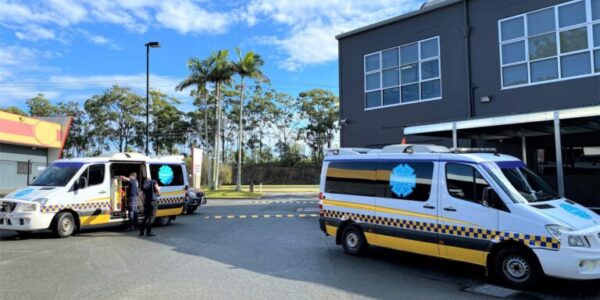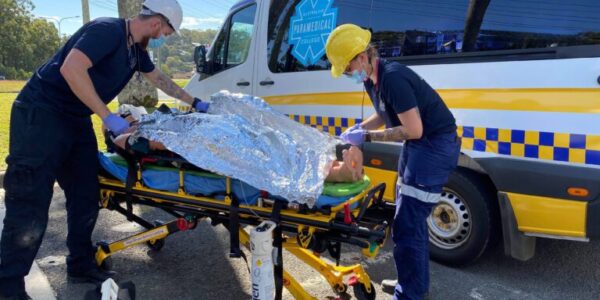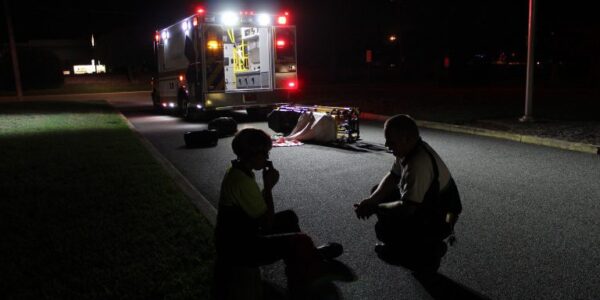What is an Offshore Medic?
An Offshore Medic typically works in the oil and gas industry, on a drilling rig, or in another offshore setting.
The nature of the work done at offshore sites is often dangerous but incredibly important. You will be on call 24/7 when working on the rig and responsible for the health and safety of the whole crew at all times. Such responsibility means offshore medics are well paid. It can be a lucrative career and a popular alternative pathway to becoming a paramedic.
Working in such a remote location means the role goes beyond that of a typical Paramedic or Medic working in the industrial or resources industry. As well as responding to major and minor emergencies on-site, you’ll also be required to undertake primary healthcare and clinical duties ranging from assessments and history taking to blood collection and injury prevention.
Typical duties of an Offshore Medic
The duties of an offshore medic/paramedic will vary depending on the size and location of the site you’re working on, your qualifications, and the size of your team/workforce you are responsible for. Some typical duties include:
- Responding to minor or major on-site injuries and providing medical care.
- Administer basic life support if necessary.
- Injury management including paperwork, liaising with patients, physiotherapists, doctors, and human resources departments.
- Undertaking drug and alcohol testing.
- Providing medical clearances to potential employees and return-to-work employees.
- Administering flu vaccinations.
- Fever temperature checks.
- Respond to vehicle accidents.
Average Offshore Medic salary
Offshore Medics can expect a salary of $114,000 and upwards.*
*Source: Jooble (2024)
Salaries may rise further with overtime, specialised skills, or certifications, making it a lucrative career option. Offshore Medics working in high-risk or remote locations can also receive allowances or bonuses, boosting their overall compensation.
How to become an Offshore Medic
Before becoming an Offshore Medic, you’ll need to have around at least 3 years of experience as a Registered Paramedic under your belt.
Studying the HLT51020 – Diploma of Emergency Health Care with Australian Paramedical College can help you build the foundational knowledge and practical skills you need to get on the pathway to university to become a Paramedic.
For some offshore roles, you may need to also have specialist skills related to the industries and environments you plan to work in.
Study with APC
Studying with Australian Paramedical College (APC) offers you the flexibility to develop the core skills and qualifications needed to progress towards a career as an Offshore Medic.
Through the HLT51020 – Diploma of Emergency Health Care, you’ll gain a solid foundation in emergency healthcare, which serves as a stepping stone toward university-level paramedic qualifications.
APC’s blend of online learning and hands-on clinical workshops ensures you’re prepared for the challenges of offshore work, with access to a network of industry partners for valuable clinical placements.
Offshore Medic skillset and qualities
Excellent clinical skills
Working on an offshore rig (or similar) holds high risks for all employees. Offshore Medics must maintain their skills to ensure safety at all times.
Proactive
An Offshore Medic can be expected to fulfil a range of tasks so being proactive is important to maintaining site operations and ensuring safety for all.
Decision making
Offshore Medics must think on their feet when dealing with medical emergencies, highlighting the essential nature of prompt and effective decision-making
Yes, some offshore roles may require additional certifications or training specific to the industry, such as oil and gas safety courses.
Offshore Medics typically have at least three years of experience in emergency healthcare, often gained by working as a Paramedic or Medic in other high-pressure settings.
APC provides the foundational knowledge and practical skills through the HLT51020 – Diploma of Emergency Health Care, giving you a pathway to university qualifications and preparing you for offshore roles.
Offshore Medics typically work in remote, isolated environments like oil rigs, where they are on call 24/7. Shifts can last several weeks, followed by time off.
Offshore Medics can progress to senior roles or specialise further in remote medical fields, industrial safety, or higher-level paramedic roles.


